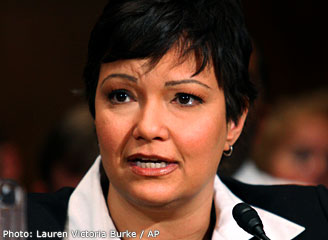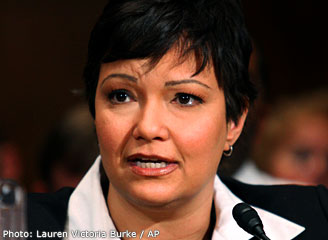The Environmental Protection Agency told the White House on Friday that climate change is a danger to public welfare — a move that takes the administration a step closer to regulating planet-warming greenhouse gases.
The agency’s finding — which the White House will now review — comes in response to an April 2007 Supreme Court decision that greenhouse-gas emissions could be regulated under the Clean Air Act if the EPA determines they pose a threat to public health and welfare. The Bush administration refused to move forward on this assessment, despite the ruling. The White House even went as far as to refuse to open an email from the EPA containing its finding.
The Obama administration, in contrast, has been pushing ahead on the assessment faster than expected. The Washington Post reports that the EPA completed its finding and sent it to the White House Office of Management and Budget late last week.
“It’s an enormous step forward compared to the eight years of denial under the Bush administration,” David Bookbinder, chief climate counsel at the Sierra Club, told Grist. “Once endangerment is found, EPA has a mandatory duty to regulate.”
OMB will now conduct a three-week inter-agency review of the finding, according to plans leaked earlier this month. EPA Administrator Lisa Jackson is expected to sign off on the finding on April 16, kicking off a 60-day public comment period before it’s finalized.
The endangerment finding increases the pressure on Congress to pass a climate bill, said Tim Telleen-Lawton of Environment America. “Carbon dioxide and other global warming pollutants are real threats to our well-being,” he said. “We’re going to be moving forward on stopping global warming one way or another. Congress should take the lead in passing comprehensive global warming legislation.”
Bookbinder agreed that the heat is now on Congress, but he still doesn’t think they’ll produce a climate bill in 2009. “I believe it’s unlikely we’ll get it this year, but by the end of next year, either Congress passes that legislation, or it risks becoming irrelevant to this debate and having EPA become the primary drafter of our climate policy,” he said.
Enviros and industry types alike tend to agree that it would be better to have new climate legislation from Congress than to have the Obama administration address climate change under the Clean Air Act, which is not particularly well-suited for regulating greenhouse gases. “The mechanism of the Clean Air Act is relatively inflexible, and can lead to really extreme regulations of the pollutant,” said Ken Green, a resident scholar at the American Enterprise Institute who focuses on climate policy. “If they go ahead, it’s going to be very hard on the economy.”
The completion of the endangerment finding will kick-start the process of figuring out how to regulate greenhouse gases, but it’s not clear how rapidly that will progress. During the presidential campaign, an Obama adviser indicated that the administration would allow about 18 months for Congress to act on the issue first. Bookbinder estimates that there could be regulation of at least the two biggest sources of greenhouse-gas emissions — coal-fired power plants and automobiles, which together account for more than half of all emissions — by early 2010.
Green argued that a new bill might actually work faster than regulation under the Clean Air Act, since the latter would almost inevitably get tied up in litigation.
Either way, regulation looks to be coming — and relatively swiftly, in Washington terms. “We’re pleasantly surprised, and very encouraged, by how quickly the Obama administration is doing this,” said Bookbinder.




